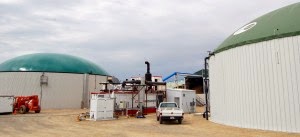August 06, 2014 7:30 am • By Jessica VanEgeren| The Cap Times
Photo courtesy of the Capital Times article. Methane from manure digesters on the Crave Brothers Farm produce enough electricity to power 550 average homes.
Supporters of a surge in the construction of manure digesters and the non-fossil fuel bioenergy they produce say a proposed buyback rate cut by one of the state’s largest utilities would halt their growth.
Milwaukee-based We Energies has submitted a rate filing change to the state’s Public Service Commission that would drop the buyback rate for new customer-sited bioenergy products, like digesters that process manure and food waste, from 9.2 cents to 4.24 cents per kilowatt-hour.
The amount utilities pay for the methane gas is critical in the financial viability of the emerging use of the digesters in Wisconsin and nationally.
The surge in digesters began in 2001 when the state started its Focus on Energy program. It required utilities to obtain 10 percent of their energy from renewables — wind, solar, bio gas — by 2015. Consequently, manure digesters have been popping up across the state.
Wisconsin now has 34, the most in the nation, with two more scheduled to begin operating by 2015. In the digesters, bacteria eat biomass like manure, food scraps or whey and emit energy in the form of methane gas.
“No dairy farm or food processor can make the economics of generating electricity from bioenergy work at such a low rate,” said Tyler Huebner, executive director of ReNew Wisconsin. “This rate is guaranteed to stifle new bioenergy development in We Energies’ territory.”
If approved by the PSC, the new rate would apply to new digester projects beginning Jan. 1, 2016. Most existing digesters have 10-year contracts with We Energies. The new rate will not impact those customers until the contracts end.
ReNew Wisconsin said there are five existing bioenergy digesters connected to We Energies: the Forest County Potawatomi Digester in Milwaukee, Green Valley Dairy in Shawano, Clover Hill in Campbellsport, Volm Farms in Addison and Crave Brothers in Waterloo.
Cathy Schulze, a We Energies spokeswoman, confirmed We Energies has five customers under its current buyback rate but would not confirm the specific customers. She said each of the customers has a 15-year contract, with most expiring in a decade. “They were already aware this rate would not be continued,” Schulze said.
She said We Energies is cutting the rate because customers that generate some of their own power also use the grid in order to sell excess power that is not used on their own property. Since the power grid is paid for and used by all customers, “we contend that those other customers should only have to pay a comparable market rate for that power.”
For example, the two digesters on the Crave Brothers’ farm produce enough methane gas to power the farm, a cheese factory and an additional 300 homes, said owner Charles Crave. The remaining energy is sold to We Energies by Clear Horizons, the owners of the digesters.
Crave said utilities are looking to make money in the renewable energy market, and We Energies is no exception.
We Energies owns the state’s two largest wind farms, Glacier Hills Wind Park and Blue Sky Green Field, Schulze said. She said the utility also has invested $1 billion in renewable energy, including the wind farms and a biomass plant in Rothschild.
“What the utility is doing is snookie. It’s sneaky and underhanded,” Crave said. “Why would they want to give others those green dollars when they can get the money themselves?”
Lawmakers had an opportunity to expand the program earlier this year but the Democratic-sponsored bill died in the Republican-controlled Legislature.
Consequently, some digester owners are flaring off, or burning, the methane gas emitted from digesters because it cannot be processed or sold.
Others are searching out partners to make deals. Take La Crosse-based Gundersen Health Systems. It owns two digesters in Dane County, the final two of 10 renewable energy projects that are part of the company’s lofty 2008 plan to move off the power grid and achieve energy independence in six years, or by the end of this year.
When the two digesters in Dane County reach full production capacity later this year, Gundersen will hit the mark.
For the next five years, Madison Gas and Electric is buying back 1.5 megawatts of power from Gundersen’s community digester in Springfield for more than 11 cents a kilowatt hour. Through a separate contract with Gundersen for the Springfield digester, MGE is buying back the remaining half megawatt at 6 cents a kilowatt hour.
Dane County essentially traded some of its renewable energy credit with MGE to make the project financially viable for Gundersen.
“That agreement made the math work for Gundersen,” said Dane County Executive Joe Parisi in a July Cap Times article. “That deal needed to be made to make the digester happen.”
Murray Sim is executive vice president of Clean Energy of North America, an energy consulting and project development company for large biogas and natural gas projects.
He said third-party investors are looking to spend “billions on renewable projects” across the country and the uncertainty in Wisconsin is putting the state at a competitive disadvantage.
“What you have in Wisconsin is a story that started before We Energies. What you have is uncertainty created by the Public Service Commission,” Sim said. “The PSC has not come out strongly to say that third-party owned generation is OK. Wisconsin is missing out on a significant industry trend and customers are paying more for energy because of it.”
Read the article at the Capital Times.

